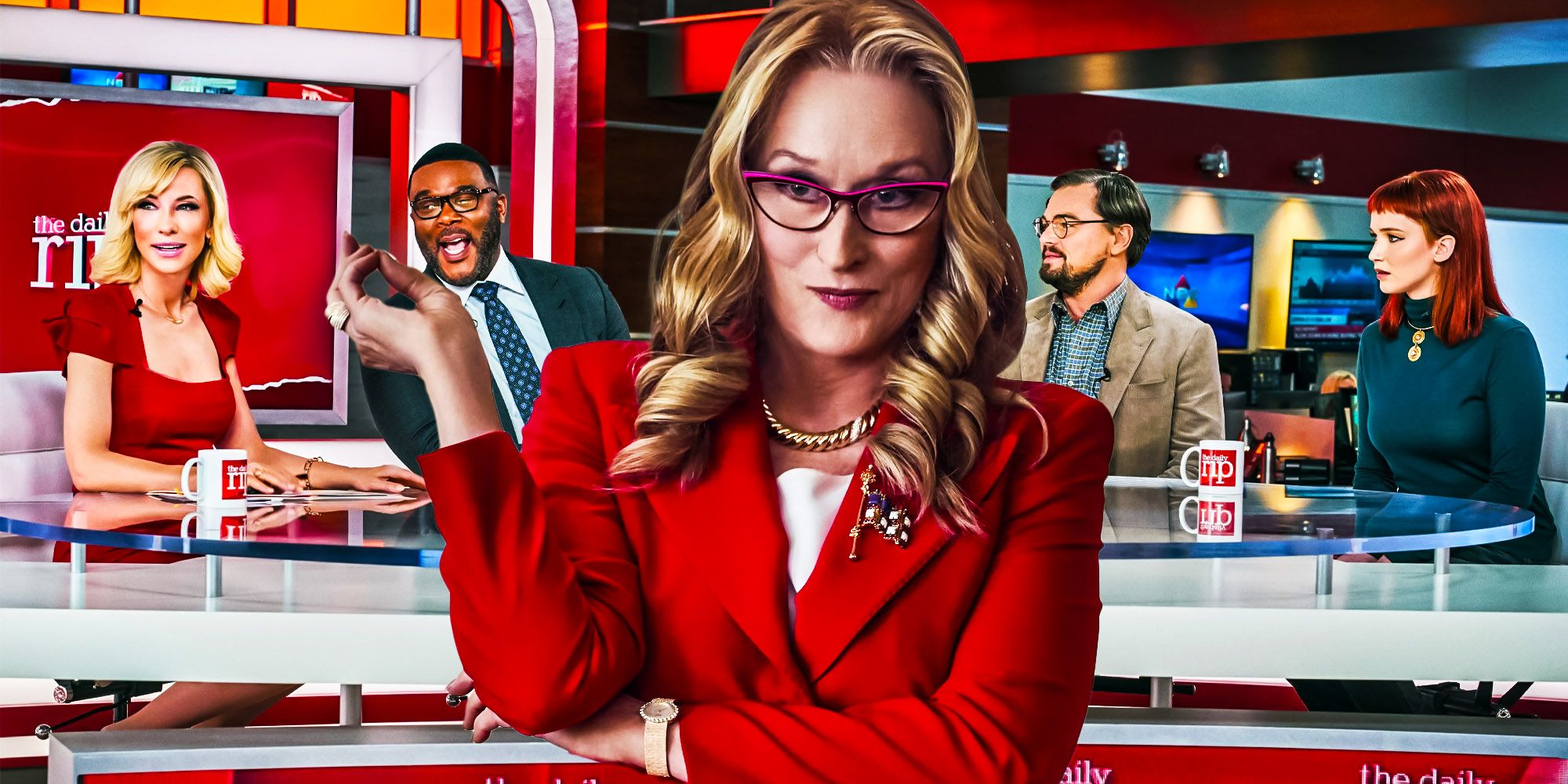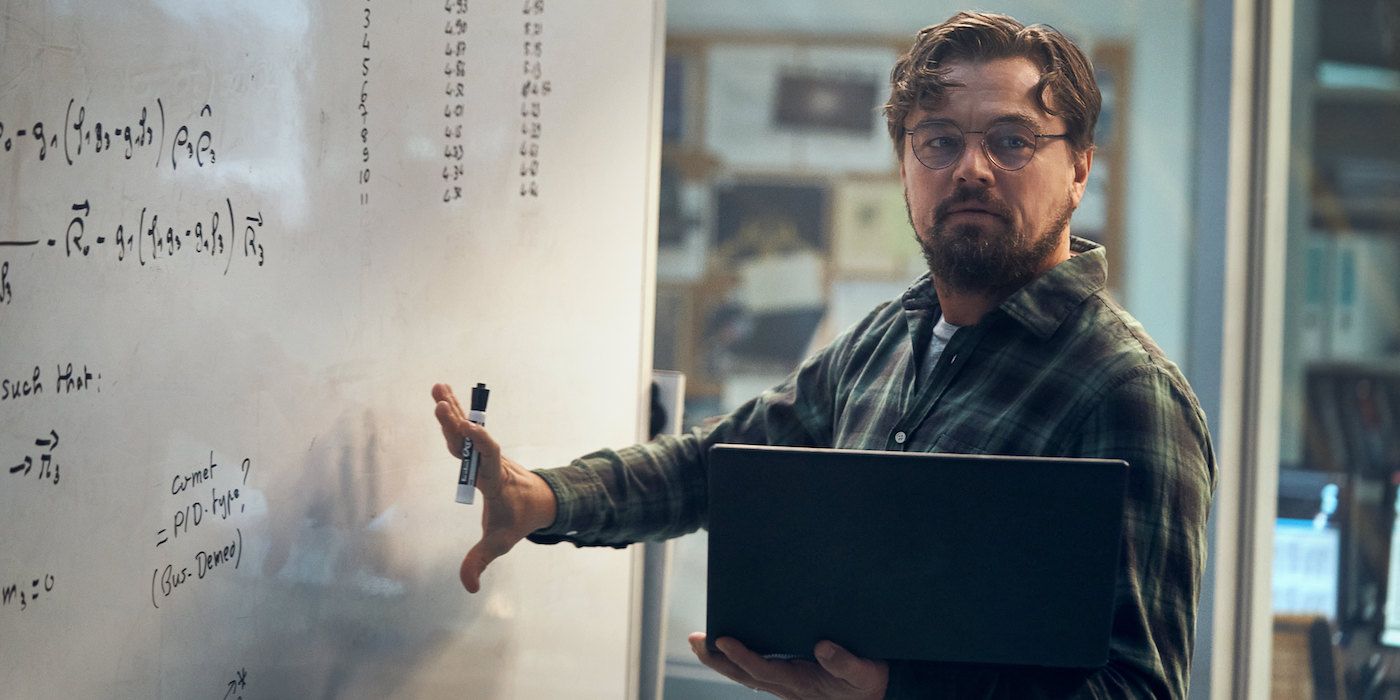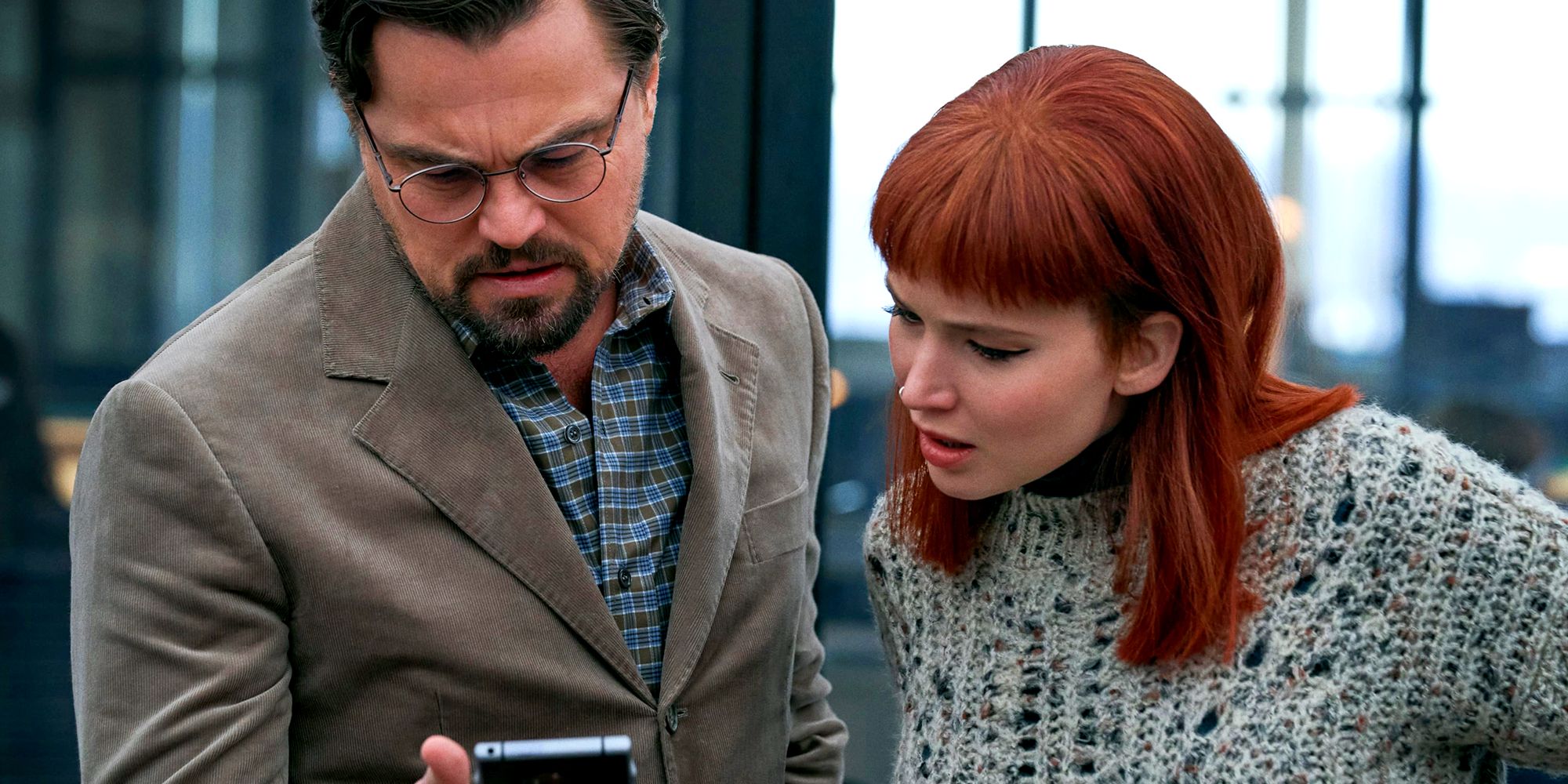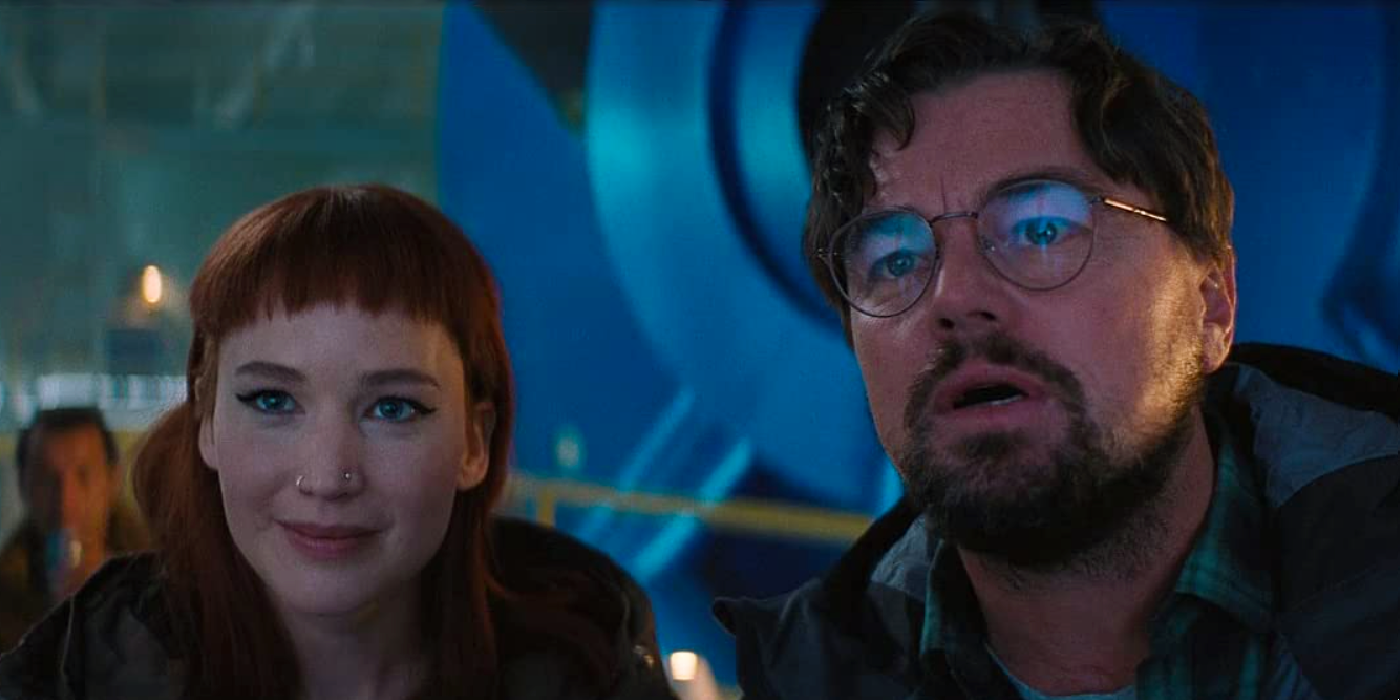The critic and audience response to Don't Look Up has been extremely mixed after its release on Netflix on December 24 and can be mostly summarized in two factions: those who focus on its artistic merits and flaws and those who sternly believe its practical implementation is not as important as its message. The fiery debate ranging online and offline between supporters, and even just mild critics of Adam McKay's satirical comedy, is nothing new. The debate on whether or not a work of art's "message" should receive more coverage periodically gets brought up, so when a movie or TV show does cover an important topic, viewers tend to focus more on that than on the movie's artistic features.
Don't Look Up follows Ph.D. candidate Kate Dibiasky (Jennifer Lawrence) and Professor Randall Mindy (Leonardo DiCaprio), both astronomers of Michigan State University, and their discovery of a comet whose trajectory shows it will impact the Earth in six months. NASA scientist Teddy Oglethorpe (Rob Morgan) helps them deliver their findings to US President Janie Orlean (Meryl Streep) and her chief of staff and son Jason Orlean (Jonah Hill), but they don't take it seriously enough, as doing so would clash with their political objectives. As the news story reaches the public, Don't Look Up cleverly details all the reactions to it, from the media, millionaire entrepreneurs, and the general public alike, who wholeheartedly try to ignore it, profit from it, or actively dispute its truthfulness.
The sci-fi satirical comedy written, directed, and produced by McKay barely passes the mark for critics on Rotten Tomatoes, while the audience's votes seem to be more supportive of it. A specific category that unanimously supported Don't Look Up is scientists. They not only lauded the movie but also commented on how the media's portrayal in it eerily mirrors how news organizations behave in real life when tackling climate change. Even so, how realistic Don't Look Up is or isn't does not inherently speak of its merits or flaws, so it wouldn't necessarily stand opposite to negative reviews of it. At the center of the debate is whether how important a film's message is makes it unassailable, especially when the movie is an allegory of climate inaction. Thus, a question cannot help to arise: does it matter that Don't Look Up is a bad movie?
Don't Look Up Isn't A Good Movie
While some recurring jokes land and wittily explore the greed of the elites, such as Don't Look Up's general charging Kate and Randall for snacks at the White House, Don't Look Up as a whole doesn't seem to know what it is as a movie -- if it's a farcical comedy, black comedy, or pessimistic drama. The sci-fi comedy is stuck for most of its running time on reiterating how the terrible events predicted by the scientists will happen and nobody's listening to them, but while making it unavoidable to see parallels between fiction and real-life worldwide crises - be it the handling of the covid-19 pandemic or climate change, it does not offer any further insight or thoughtful consideration. A comedy shouldn't necessarily make viewers laugh, but, as a movie, it should entertain them or, at the least, leave them with something to reflect on. Don't Look Up does neither, preferring to insist on the message that this alarming event is happening and nobody's doing anything about it, repetitively hammering into the viewers' minds with no possibility of further reflection on the story's meaning.
Don't Look Up Has An Important Message
It's universally acknowledged - and even expressly told - by the movie's producers that Don't Look Up is an allegory for climate inaction. The comet is used to convey the message in order to make it explicitly clear that if world leaders and companies do nothing to combat climate change, the destruction of the world as it's currently known is inevitable. Considering how, until recently, newspapers covered news about climate change by treating climate change facts as if they were on the same level of climate-denying hoaxes, pursuing balance by looking at both sides of the debate, it's reasonable that not only the tone of Don't Look Up is urgent and angry at what's happening, but also that its anger is aimed mainly at the media establishment.
The other major theme explored by McKay's satire is the elites' greed. It could be seen in President Orlean trying to spin the comet news to her political advantage, but also in tech company BASH's CEO Peter Isherwell (Mark Rylance) when he suggests the mission to try and destroy the comet should be reconsidered, as the comet could be mined for minerals, therefore proving to be something they could profit from. Don't Look Up plays on the absurdity of trying to profit off of a sure disaster, especially one of the world-ending proportions proposed by Don't Look Up's comet. While not directly related to climate change or covid-19, the allegory rings true, especially considering the recent reports about the pandemic increasing the net worth of billionaires worldwide. Don't Look Up has many crucial topics it wants to shine a light on, and whether its implementation has more flaws than merits, those messages should still be retained, especially for its real-world consequences.
Don't Look Up's Quality Vs. Message Is Partly Why It's So Divisive
Since its limited release in theatres, Don't Look Up has polarized the opinions of its viewers. On one side, there were those who would support it no matter what, as they felt the results of climate inaction could finally be clearly seen on screen, making it a timely and important movie, and, on the other side, those who focused more on the movie's artistic flaws, evaluating it as they would with any other movie, regardless of the importance of its message. This perception led to a divisive two-sided debate that never really touched upon Don't Look Up's merits.
The debate would even sometimes be weaponized by those who would suggest that criticizing the movie could equate to denying climate change, despite what was being discussed by the factions were two very different things. Some of Don't Look Up's producers even contributed to the miscommunication, as they responded to negative reviews by retweeting supporters who reiterated the movie's importance while citing critics' reviews that focused on the film's practical execution rather than its message. The dissonance between Don't Look Up's crucial message and its poor implementation only contributes to a debate that should really be divided in two: regardless of its message, is Don't Look Up well-made? More generally, is the message of a work of art more important than its implementation?
Does It Matter That Don't Look Up Is A Bad Movie?
People might disagree on Don't Look Up's strengths and weaknesses, but the movie's shattering records are indisputable, as following its Netflix release, it stayed for two consecutive weeks in the streaming platform's Top 10 most watched movies globally, by being streamed for 152.29 million hours, according to Netflix's latest data. As the debate on Don't Look Up mirrors many had in the past on movies that similarly focused on crucial and timely topics but that weren't necessarily well-received, not because of their message but because of their qualities, it could be said that the debate is timeless. Is the message more important than the vehicle used to transmit it? What conveys the message is a work of art, and many movies, books, and TV shows have focused on highly political, societal, and generally considered important themes. Some, like recently released The Power of the Dog and its exploration of toxic masculinity, or Ridley Scott's The Last Duel and its unmissable timeless message about sexual violence and victim-blaming, were well-made. Others were less so.
However, critics review the work of art, not the message. The message cannot overshadow the movie itself, just because it's finally being discussed. It's not enough, as even just to convey the very important message properly, the movie should leave viewers with thoughts to ruminate on, not a conviction they were either right or wrong. Otherwise, it would just be like shouting something in an echo chamber: you leave out those who disagree with the message, you include those who agree, but, all in all, nobody reflects on what they've just watched. Don't Look Up does just that, and in not focusing on what could have been better in its practical implementation, it might even risk jeopardizing the sharing of the message it's trying to convey.





